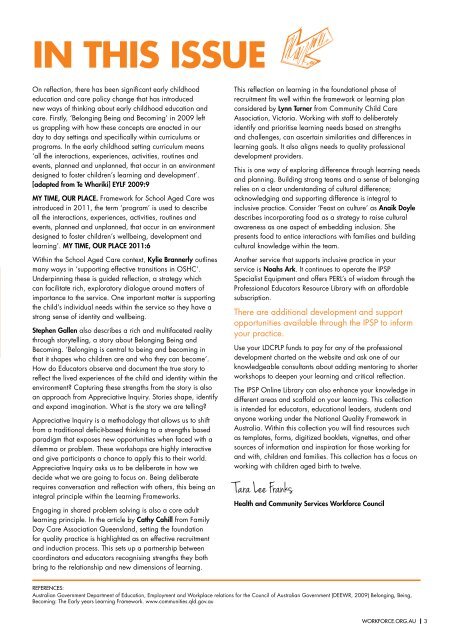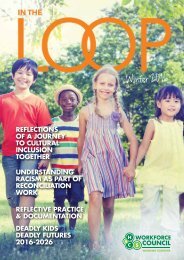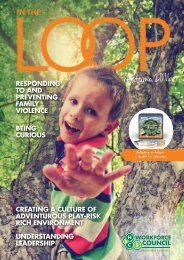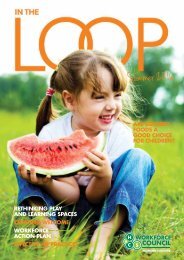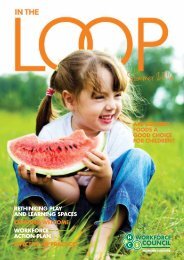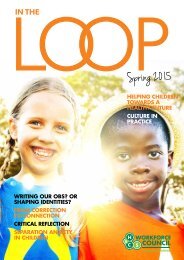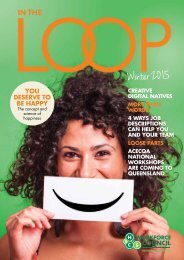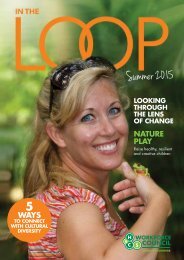Autumn 2015
Create successful ePaper yourself
Turn your PDF publications into a flip-book with our unique Google optimized e-Paper software.
IN THIS ISSUE<br />
On reflection, there has been significant early childhood<br />
education and care policy change that has introduced<br />
new ways of thinking about early childhood education and<br />
care. Firstly, ‘Belonging Being and Becoming’ in 2009 left<br />
us grappling with how these concepts are enacted in our<br />
day to day settings and specifically within curriculums or<br />
programs. In the early childhood setting curriculum means<br />
‘all the interactions, experiences, activities, routines and<br />
events, planned and unplanned, that occur in an environment<br />
designed to foster children’s learning and development’.<br />
[adapted from Te Whariki] EYLF 2009:9<br />
MY TIME, OUR PLACE. Framework for School Aged Care was<br />
introduced in 2011, the term ‘program’ is used to describe<br />
all the interactions, experiences, activities, routines and<br />
events, planned and unplanned, that occur in an environment<br />
designed to foster children’s wellbeing, development and<br />
learning’. MY TIME, OUR PLACE 2011:6<br />
Within the School Aged Care context, Kylie Brannerly outlines<br />
many ways in ‘supporting effective transitions in OSHC’.<br />
Underpinning these is guided reflection, a strategy which<br />
can facilitate rich, exploratory dialogue around matters of<br />
importance to the service. One important matter is supporting<br />
the child’s individual needs within the service so they have a<br />
strong sense of identity and wellbeing.<br />
Stephen Gallen also describes a rich and multifaceted reality<br />
through storytelling, a story about Belonging Being and<br />
Becoming. ‘Belonging is central to being and becoming in<br />
that it shapes who children are and who they can become’.<br />
How do Educators observe and document the true story to<br />
reflect the lived experiences of the child and identity within the<br />
environment? Capturing these strengths from the story is also<br />
an approach from Appreciative Inquiry. Stories shape, identify<br />
and expand imagination. What is the story we are telling?<br />
Appreciative Inquiry is a methodology that allows us to shift<br />
from a traditional deficit-based thinking to a strengths based<br />
paradigm that exposes new opportunities when faced with a<br />
dilemma or problem. These workshops are highly interactive<br />
and give participants a chance to apply this to their world.<br />
Appreciative Inquiry asks us to be deliberate in how we<br />
decide what we are going to focus on. Being deliberate<br />
requires conversation and reflection with others, this being an<br />
integral principle within the Learning Frameworks.<br />
Engaging in shared problem solving is also a core adult<br />
learning principle. In the article by Cathy Cahill from Family<br />
Day Care Association Queensland, setting the foundation<br />
for quality practice is highlighted as an effective recruitment<br />
and induction process. This sets up a partnership between<br />
coordinators and educators recognising strengths they both<br />
bring to the relationship and new dimensions of learning.<br />
This reflection on learning in the foundational phase of<br />
recruitment fits well within the framework or learning plan<br />
considered by Lynn Turner from Community Child Care<br />
Association, Victoria. Working with staff to deliberately<br />
identify and prioritise learning needs based on strengths<br />
and challenges, can ascertain similarities and differences in<br />
learning goals. It also aligns needs to quality professional<br />
development providers.<br />
This is one way of exploring difference through learning needs<br />
and planning. Building strong teams and a sense of belonging<br />
relies on a clear understanding of cultural difference;<br />
acknowledging and supporting difference is integral to<br />
inclusive practice. Consider ‘Feast on culture’ as Anaik Doyle<br />
describes incorporating food as a strategy to raise cultural<br />
awareness as one aspect of embedding inclusion. She<br />
presents food to entice interactions with families and building<br />
cultural knowledge within the team.<br />
Another service that supports inclusive practice in your<br />
service is Noahs Ark. It continues to operate the IPSP<br />
Specialist Equipment and offers PERL’s of wisdom through the<br />
Professional Educators Resource Library with an affordable<br />
subscription.<br />
There are additional development and support<br />
opportunities available through the IPSP to inform<br />
your practice.<br />
Use your LDCPLP funds to pay for any of the professional<br />
development charted on the website and ask one of our<br />
knowledgeable consultants about adding mentoring to shorter<br />
workshops to deepen your learning and critical reflection.<br />
The IPSP Online Library can also enhance your knowledge in<br />
different areas and scaffold on your learning. This collection<br />
is intended for educators, educational leaders, students and<br />
anyone working under the National Quality Framework in<br />
Australia. Within this collection you will find resources such<br />
as templates, forms, digitized booklets, vignettes, and other<br />
sources of information and inspiration for those working for<br />
and with, children and families. This collection has a focus on<br />
working with children aged birth to twelve.<br />
Tara Lee Franks<br />
Health and Community Services Workforce Council<br />
REFERENCES:<br />
Australian Government Department of Education, Employment and Workplace relations for the Council of Australian Government (DEEWR, 2009) Belonging, Being,<br />
Becoming: The Early years Learning Framework. www.communities.qld.gov.au<br />
WORKFORCE.ORG.AU 3


